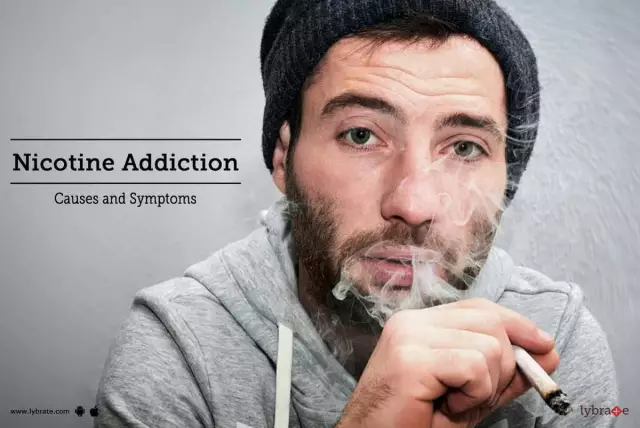- Author Rachel Wainwright wainwright@abchealthonline.com.
- Public 2023-12-15 07:39.
- Last modified 2025-11-02 20:14.
Is it possible to get rid of nicotine addiction?
According to statistics, about 34% of citizens in Russia smoke. Most tobacco users develop health problems sooner or later. Not only smokers themselves suffer, but also their loved ones. In addition, cigarettes are not cheap, and the need to purchase them is a heavy burden on the budget of thousands of Russian families. Many people dream of giving up their addiction, but not everyone succeeds in doing this: nicotine addiction is addictive, getting rid of it is not easy.

Source: depositphotos.com
Habit or disease?
According to the classification of the World Health Organization, nicotine addiction is a serious disease that requires qualified treatment. No more than 7% of smokers can quit this habit without the help of doctors - those whose metabolic features allow them to endure quitting tobacco without experiencing almost any unpleasant sensations. The rest of the people who decide to quit smoking face serious problems.
The fact is that when you inhale tobacco smoke, nicotine almost instantly enters the bloodstream, and after seven seconds it reaches the brain and stimulates the so-called nicotinic acetylcholine receptors. The brain sends a signal to the adrenal glands that triggers the release of adrenaline. In addition, the action of nicotine in the blood increases the level of glucose and dopamine ("pleasure hormone"). In general, nicotine acts as a psychostimulant: after a smoked cigarette, a person feels a slight euphoria, feels calm and full of energy. The need to repeat such sensations gradually develops, the body begins to need an increase in the dose of the substance that causes them. It is this effect of nicotine that underlies the physical addiction to smoking.
But that's not all. Smoking becomes a behavioral stereotype over time. Simply put, a person gets used not only to inhaling tobacco smoke, but also to the ritual associated with this action. The addiction is reinforced by the fact that smoking often serves as a means of communication. Teenagers who are just starting to try cigarettes often perceive their use as a sign of independence and high status in youth groups. At the age of 14-16, for the formation of a persistent addiction, it is enough to smoke one or two cigarettes a day for a couple of months.
In fact, tobacco use only harms the smoker himself and everyone around him. The negative effect of smoking on health, work capacity and even appearance has been proven. This habit is one of the main causes of pulmonary, cardiovascular and oncological diseases. Children of mothers who smoke often have physical and intellectual developmental delays. In fact, addiction to tobacco use is nothing more than drug addiction.
Modern methods of getting rid of nicotine addiction
Most people who dream of quitting smoking make their first attempts of this kind on their own. The confidence that you can quit whenever you want is common even for smokers with years of experience. This is understandable: a person is pleased to think that he has no dependence and that he is completely free in making decisions and implementing them. Disappointments are inevitable here. As a rule, in the first hours spent without cigarettes, the smoker is faced with withdrawal symptoms. Usually observed:
- sleep disorders;
- anxiety;
- irritability;
- difficulty concentrating;
- constant hunger;
- obsessive cough associated with the onset of bronchial cleansing;
- copious secretion of dark-colored sputum.
In addition, nausea, headache, dizziness and other discomfort are possible. A person really wants to smoke and understands that a cigarette will immediately improve his health. This aggravates his suffering and is the first reason for the breakdown (return to smoking).
The main mistake of such attempts is the refusal of professional help. Contacting a narcologist allows you to get qualified advice on the tactics of treating the disease and the use of drugs, based on the individual characteristics of the patient's body and the duration of tobacco use. Typically, patients are prescribed nicotine replacement therapy (taking substances that act similar to nicotine), as well as treatment that helps to tolerate withdrawal symptoms less painfully.
In addition, the following measures are believed to greatly facilitate the quitting process:
- the introduction of a large amount of fruits and vegetables into the diet. It is very important to consume a lot of aromatic herbs (basil, celery, parsley, dill, etc.);
- an increase in the volume of fluid consumed (the body needs to get rid of toxins);
- increased physical activity. Long walks, swimming, jogging and other sports are encouraged;
- taking expectorant drugs (preferably of plant origin);
- rejection of behavioral stereotypes associated with smoking;
- limiting the intake of strong coffee and alcohol;
- temporary refusal (if possible) from communicating with smokers and visiting public places where smoking is allowed.

Source: depositphotos.com
The success of nicotine addiction treatment is to a large extent related to the person's ability to control himself and patiently wait for positive results. In fact, they appear very quickly: already on the first day, blood pressure and pulse normalize, a week later the morning cough disappears, after 14 days breathing becomes easier and irritability disappears. After giving up cigarettes, the sense of smell is restored and the appetite improves. This fact causes concern for many patients: they are afraid to gain a lot of weight. But if you follow the rules of a healthy diet, troubles of this kind are easy to avoid. Over time, withdrawal symptoms diminish and the urge to smoke diminishes. Experts believe that the brain is completely accustomed to the lack of nicotine for a year.
Quitting smoking is within the power of anyone. It is enough to realize the presence of the disease and the need for its treatment, competently approach the problem, calling on specialists for help, and success (and with it a significant improvement in the quality of life) is ensured.
YouTube video related to the article:

Maria Kulkes Medical journalist About the author
Education: First Moscow State Medical University named after I. M. Sechenov, specialty "General Medicine".
Found a mistake in the text? Select it and press Ctrl + Enter.






